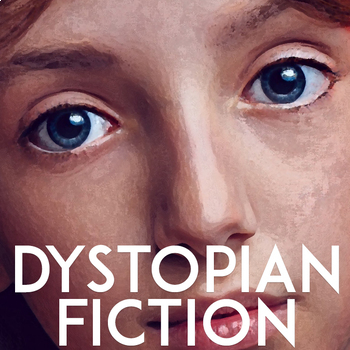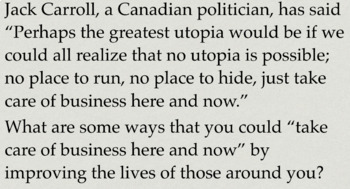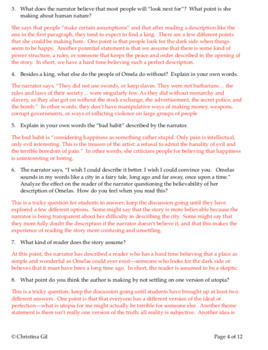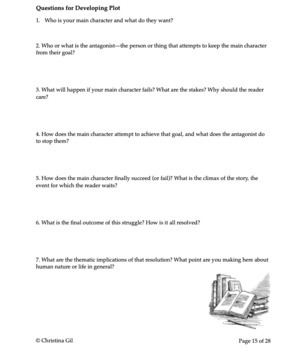Dystopian Short Stories Unit: The Lottery Shirley Jackson, Harrison Bergeron
- Zip
What educators are saying
Description
Want to utilize your students’ love of dystopian fiction to keep them engaged and get them thinking about how they can make a difference in their worlds?
Dystopian fiction is lots of fun—it’s imaginative, creative, and innovative. But when your classes read these texts as pure fiction that doesn’t relate to real life, they won’t make the connections to their own worlds, and they won’t feel the responsibility to make a difference in their lives. Even worse, students might use this kind of fantastic writing as an escape from reality and an excuse to disengage from the world. This kind of reading experience can result in a generation that is passive and disconnected and lets the state of things get even worse than it already is.
Good dystopian fiction is more than a fun fantasy—it’s a way to see human nature in a new light and start thinking about how we might do things differently.
The classic stories in this bundle deal with themes of scapegoating and bullying, societal violence and suffering, injustice and dissent, and equality and freedom—but these units don’t just leave those discussions as abstract issues on the page. By relating the issues and ideas to real-life problems and by engaging students in practical activities and exercises, these units will get your students thinking about how they are perpetuating the status quo in their own worlds, and how they might start to make a change.
The variety of materials, real-life connections, and innovative approaches to the information will keep students engaged and excited about learning. Additionally, the concrete text-based questions and unique sources discourage cheating and encourage students to answer for themselves.
When you teach with these innovative units you will:
- Easily plan out your unit when you utilize one of three differentiated pacing guides including plans for honors, standard, and an end-of-the-year unit.
- Begin the unit with an innovative unit on cognitive bias which will challenge your students to consider fascinating questions about the way that the human brain works.
- Start your class periods with bellringer freewrite prompts that will help students to focus, get ready to work, and begin to explore the essential questions of the texts.
- Strengthen your students’ close reading skills by taking them through close readings of the stories with the no-prep questions and handouts.
- Easily review the questions using the extensive answer keys which quote the important passages, so there is no guessing on your part as to which parts of the text are most important.
- Help your students more fully appreciate short stories and experiment with their own creativity with the proven creative writing activities focusing on setting, point of view, characterization, theme, plot, and dystopian fiction.
- Get to know your students on a deeper level when you help them to clarify their own views on important topics.
- Help your students to practice concrete tips for engaging in constructive disagreements and listening to those with whom they don’t agree when they complete a fun survival game and a discuss their answers to a fun moral dilemmas quiz.
- Inspire your classes with the stories of real-life heroes like Theo E.J. Wilson, an African American poet and activist who learned to feel compassion for those who, as he says, hated his guts, and Greta Thunberg, the unassuming teen who started the international School Strike for the Climate.
- Get your classes to write some dystopian fiction of their own by utilizing the proven guides, handouts, and tips for a short story writing workshop.
There is enough here for three solid weeks of discussing, analyzing, writing, and reading great literature. This is a unit that your students won’t soon forget!
The following products are included in this bundle, all at a discount when you buy them together here:
Critical Thinking Activities, Cogntive Bias: Nonfiction Close Reading, TED Talk (normally priced at $5.97). Get your classes exploring some fascinating and baffling questions about the human mind. Why is it that when people are faced with evidence that disputes already held beliefs, they actually become more convinced that their beliefs are correct? How do our brains that were evolved to succeed in a hunter-gatherer world make sense of the complicated information that they receive every day? Why are smart people often victims of fake news? Why do people make irrational decisions? You can view the full-priced version of this resource by clicking here.
“The Lottery” by Shirley Jackson: Dystopian Short Story Unit Plan (normally priced at $3.97) By making connections among bullying, genocide, the Nuremberg trials, Stanley Milgrim’s obedience study, and a classic poem about the Holocaust, your students will be inspired to take their study of Jackson’s powerful story past the pages of the text. You can view the full-priced version of this resource by clicking here.
Dystopian Short Story Unit Plan: Ursula Le Guin & Social Justice (normally priced at $2.97). In this classic of dystopian fiction, Ursula Le Guin describes a city where people celebrate happily without a care in the world—except for one child, kept in miserable conditions. “The Ones Who Walk Away from Omelas” is a wonderful choice for inspiring your classes to make a difference in their worlds. You can view the full-priced version of this resource by clicking here.
Harrison Bergeron by Kurt Vonnegut: Dystopian Short Story Unit (normally priced at $2.97). Focusing on the importance of healthy conflict and dissent, how to feel compassion and empathy for those who disagree with us, and people who are making a difference, this unit will challenge your students to think about values, differences, and dialogue in new ways. You can view the full-priced version of this resource by clicking here.
Short Story Writing Workshop Guide: Activities, Prompts, Process, & Resources (normally priced at $7.97). This rigorous, practical guide has been honed over my years of trial and error, and it gives you all you need to bring your students’ writing to the next level. The guides and handouts included in this resource will work for nonfiction personal essays, fictional short stories, and even poetry writing. When you end your dystopian fiction unit with a writing workshop in which students create their own dystopian worlds, you’ll teach a unit that your classes won’t soon forget. You can view the full-priced version of this resource by clicking here.
These resources would make a great introduction to a unit on a dystopian novel, propaganda, or any time in history when people made dangerous decisions; suggestions include The Hunger Games, Animal Farm, 1984, Slaughterhouse Five, Brave New World, The Handmaiden’s Tale, Night, The Things They Carried, Divergent, and The Giver.
There are no lectures or power points here—students will do the work themselves, with guidance from their teacher. Rather than telling them what the stories mean, you will be empowering them with the confidence and skills to tackle a challenging text on their own.





